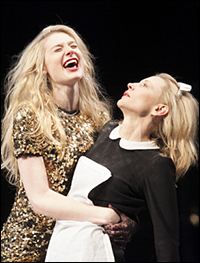
*
When one thinks of Cate Blanchett, the two-time Academy Award winner who is often hailed as one of the world's greatest living actors, the words "crude" and "unhealthy" don't often come to mind.
But Blanchett, who has previously graced the New York stage in acclaimed performances of A Streetcar Named Desire and Uncle Vanya, will next star in Jean Genet's The Maids, a violent and controversial work that was described with those unflattering adjectives following its 1947 premiere at the Théâtre de l'Athénée.
Inspired by the Papin sisters, servants who infamously murdered their employers in 1933 France, Genet's work, brought to New York by the Sydney Theatre Company, will play City Center as part of the Lincoln Center Festival.
Blanchett co-stars with Isabelle Huppert as her fellow servant, with whom she creates elaborate sadomasochistic rituals about murdering their employer, Madame, played by Elizabeth Debicki; Benedict Andrews directs.
The Papin sisters' murder scandalized society, but the two went on to achieve infamy, hailed as martyrs and revolutionaries by Simone de Beauvoir and Jean-Paul Sartre. And the play's fame has also endured over the years: It was adapted into a 1974 film directed by Christopher Miles and a 1994 chamber opera by Swedish composer Peter Bengtson.
 |
||
| Elizabeth Debicki and Cate Blanchett in The Maids |
||
| Photo by Lisa Tomasetti |
"Genet was a very dangerous and transgressive writer," Blanchett says, "continually exploring the notion that reality — social reality — is illusory, and that the human need for this illusion is so strong that no social order can be based on reality. I think this is a preoccupation that still remains."
The production features a new script, co-written by Blanchett's longtime collaborator Andrews (Gross und Klein, Big and Small, Richard II) and STC artistic director, playwright, and husband to Blanchett, Andrew Upton. The play, with its blunt portrayal of violence committed by women is not softened in its new presentation — an aspect of the production that Blanchett was happy to embrace.
"The challenge with Genet is to not smooth over the dangerous, often ugly, underbelly of his work... his obsession with murder, death, claustrophobia, brutality, dominance and submission," she says. "That's why it was so exciting to work on a new adaptation which was at once brutal, shocking, lyrical, and poetic."
 |
||
| Isabelle Huppert and Cate Blanchett in The Maids |
||
| Photo by Lisa Tomasetti |
Blanchett won her second Academy Award earlier this year for her performance in Woody Allen's "Blue Jasmine." Playing a fragile former Upper East Side society wife, trembling on the verge of a nervous breakdown following her husband's public and professional downfall, she garnered critical acclaim and numerous awards in addition to the Oscar, including Golden Globe, BAFTA, and SAG awards. While the role of a servant is a great contrast to that of Jasmine, grasping the importance of both ends of the social spectrum is critical to her success as an actor.
"I think as an actor an understanding of status is vital, whether you are playing a New York socialite or a domestic worker," she says.
"As human beings we constantly jockey for status, no matter what our race, social position or gender may be. There is, of course, a class struggle within the maids, between the maids and their mistress and master, but even between the two underdogs — Claire and Solange — there is a rampant, ever-changing power dynamic. The cut and thrust of that has been a thrilling challenge to take on."










